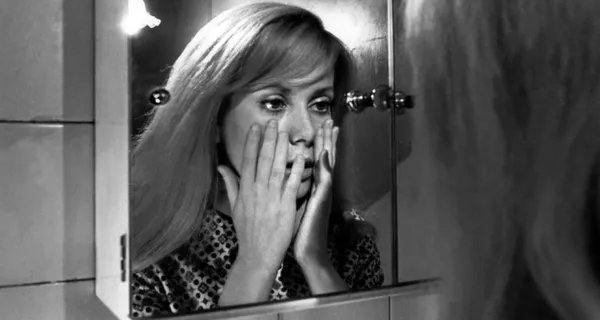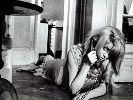Eye For Film >> Movies >> Repulsion (1965) Film Review
Repulsion
Reviewed by: Jennie Kermode

The story of a young woman whose withdrawal from the world reaches psychopathic proportions, Repulsion is that film that really launched the careers of director Roman Polanski and star Catherine Deneuve. With everything that has happened in Polanski's life since, it's strange to look back at such a powerful statement about society (and the film industry)'s treatment of women, whose echoes can be found in much later works like Inland Empire.
Yet this is also much more. The first entry in the director's Apartment Trilogy (to be followed by Rosemary's Baby and The Tenant) it's a story of social breakdown and solitary madness that gives Deneuve room to play a strangely dislocated everyman; it illustrates a moment in history when the existential conflict between traditional social structures and individualism was perhaps at its most acute.

Deneuve is Carole, a French manicurist living in London. Like her later character in Belle De Jour, she struggles with frigidity, but she doesn't have Belle's outlet. Instead, everything is focused inwardly. When her sister and her sister's boyfriend engage in noisy sex, the sound echoes in her head until she begins to hallucinate, thinking the very walls are cracking around her. The film takes us right inside her head and keeps us there for most of its running time. It's a harder and harder place to be, as we are forced to share her trauma. When her sister and the boyfriend leave on holiday, she's left alone with nobody to shield her from the clamour of the wider world.
Reading scripts, one sees male leads described in a variety of ways - brave, perhaps, or tenacious; suave or cowardly. Female leads are often described simply as 'beautiful'. Carole is beautiful, and Polanski's camera observes her with the fascination typical of European cinema at the time, but what he communicates is something different. That Carole is beautiful is all that people see. A family photograph implies she has been struggling with her internal disquiet for many years, apparently without anybody noticing. The only interest strangers seem to take in her is sexual. She responds by developing an apparent terror of men. Her boss tries to be sympathetic but clearly has no idea what's going on, and soon Carole is incapable of working.
Hollywood thrillers aside, what happens when a beautiful young woman disappears? Absolutely nothing, Polanski suggests. Holed up inside her flat, Carole can no longer eat or keep herself clean. No authority presents itself to offer guidance - the closest is the landlord, and he wants to exploit her. Faced as she is with such threats, it's easy to see how Carole takes one step further, into violence. The beauty of this film is that as it carries us along we see how Carole's every reaction makes sense, even whilst occasional glimpses through the eyes of others show clearly that she has completely lost it. Her unbalanced state seems to reflect an unbalanced world whose expectations of her are themselves far from realistic.
Repulsion is a difficult film to watch, despite its beautiful photography and the dark wit underlying much of the script. It challenges viewers to look away, then reminds us that this is exactly how people have responded to Carole throughout her life. How often do we look away from people like her? How easily do we, just like her, allow ourselves to be repulsed?
Reviewed on: 07 Apr 2010


















